Business & Management
The Women RISE Project: Building Resilience among Adolescent Girls and Young Women in Artisanal Mining Communities through Transformative Research
Published
11 months agoon

The COVID-19 pandemic profoundly affected vulnerable populations, with adolescent girls and young women in unplanned artisanal and small-scale mining (ASM) settlements bearing the brunt of its impact. Already grappling with economic hardships and inadequate healthcare access, these communities faced intensified challenges during and after the crisis, further deepening the existing inequalities.
To address some of these pressing concerns, the Women RISE research Project was launched to explore the economic and health impacts of COVID-19 on adolescent girls and young women in unplanned mining communities, examining their coping mechanisms and resilience during and after the pandemic.
The Women RISE project titled, “Economic and Health Impact and the Resilience of Last Mile Populations in Artisanal and Small-Scale Mining Unplanned Settlements in Sub-Saharan Africa Before, During and After COVID-19,” focused on Ghana and Uganda as case studies.
The project team consists of the following researchers; Betty Kwagala, Makerere University (Principal Investigator), Lydia Kapiriri, McMaster University, Canada (Co-Principal Investigator), Lydia Osei, University of Ghana (Co- Investigator), Stephen Wandera, Makerere University (Co- Investigator), Fred Ngabirano, Ministry of Gender, Labour and Social Development, Uganda (Co- Investigator/Decision maker), Deborah Mensah, Northern Empowerment Agency- Ghana (Co- Investigator) and Miriam Mutabazi, Uganda Christian University (Co- Investigator)
The composition of the research team is testimony that the two-year collaborative project brought together leading institutions from Canada, Uganda, and Ghana to assess these challenges and develop targeted interventions to enhance future crisis preparedness, with support from the International Development Research Center (IDRC).
To share these critical findings and explore policy implications, an end of project dissemination workshop was convened on 13th March 2025 bringing on board stakeholders comprising distinguished researchers, government representatives, project participants and civil society leaders for an insightful discussion on translating research into action, ensuring that adolescent girls and young women in ASM communities are better equipped to withstand future crises. Representatives from the following Ministries actively participated in the dissemination workshop: Ministry of Gender, Labour and Social Development, the Ministry of Local Government, the Ministry of Health, and the Ministry of Energy and Mineral Development.
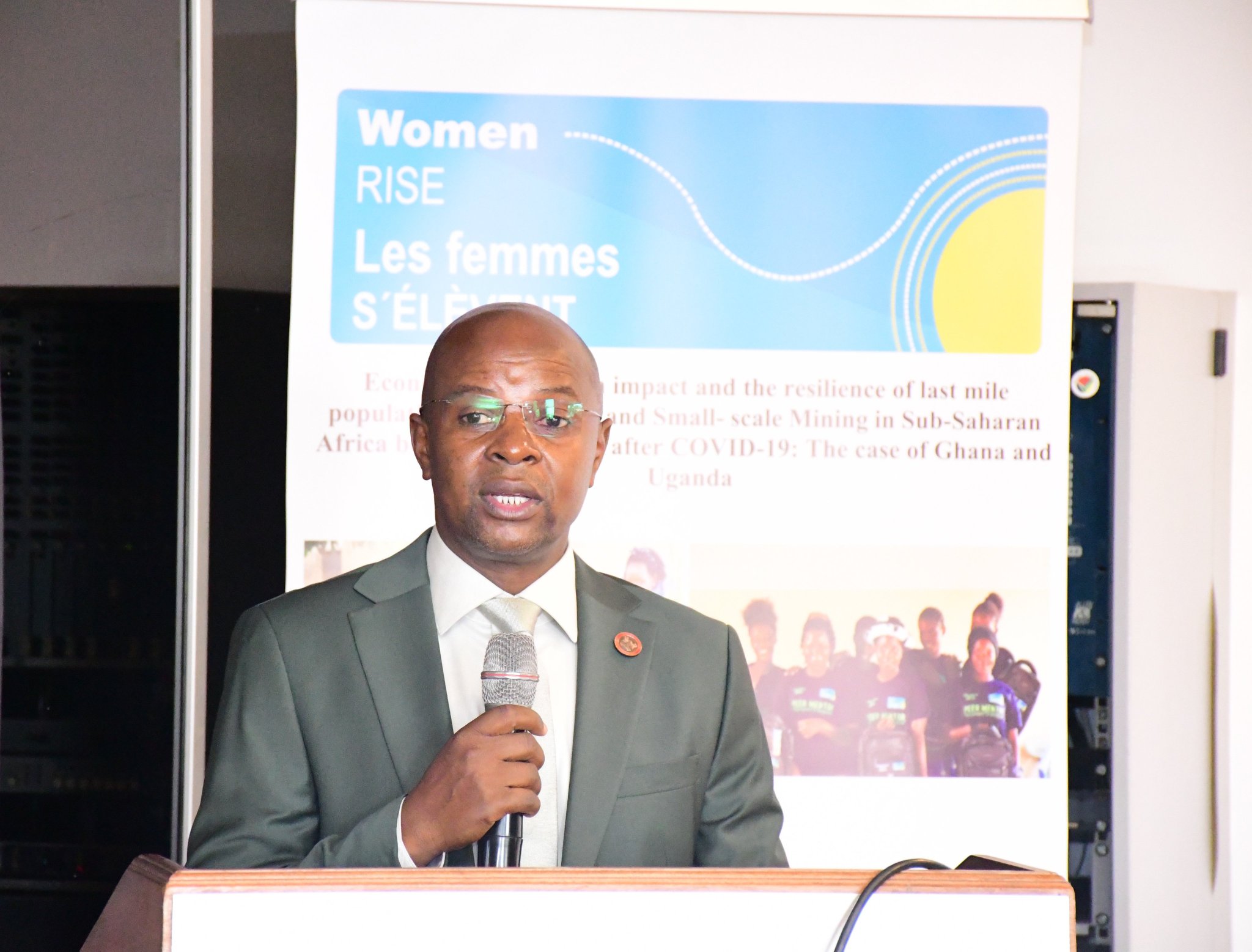
Officiating at the dissemination workshop, the Principal of the College of Business and Management Sciences (CoBAMS) at Makerere University, Prof. Edward Bbaale commended the project team for undertaking a study that highlights the pressing economic and health challenges faced by adolescent girls and young women in artisanal and small-scale mining communities in Uganda and Ghana before, during and after the CoVID-19 pandemic. He underscored the critical role of evidence-based research in shaping policies and programs that foster sustainable development.
“This collaborative project not only brings to the forefront the critical economic and health challenges faced by adolescent in the small scale mining sectors in both Uganda and Ghana, but also highlights their remarkable resilience before, during, and after COVID-19 pandemic. The work you have undertaken transcends national boundaries, reinforcing the value of international partnerships in tackling shared challenges. It is my great honor and privilege, to officially open this important workshop,” the Principal said.
Prof. Bbaale explained that research projects such as the Women Rise project, Universities play a vital role in identifying gaps and generating knowledge to guide policy and programming. He emphasized that having government, civil society, and the private sector actively engaged in research efforts significantly enhances the chances of translating findings into meaningful action. He stressed that the results of this research would be practical, policy-relevant, and instrumental in opening up more opportunities for future collaboration
“I am pleased that this project contributes meaningfully to Makerere University‘s research-led agenda, where evidence-based inquiry drives policy formulation, program design, and sustainable development. As a university, we take pride in pioneering collaborations between academia, government, and civil society, ensuring that research findings translate into actionable solutions for our communities,” he stated.
Beyond being a platform for sharing research findings, Prof. Bbaale said that the dissemination workshop serves as a critical space for dialogue among stakeholders and exploring avenues for scaling up research insights into impactful interventions. He noted that such engagements are essential in ensuring that vulnerable populations, such as adolescent girls and young women in small-scale mining communities, receive the support they need to build resilience and improve their livelihoods.
The Women RISE project created awareness of the challenges faced by adolescent girls and young women in mining areas. Some of these included: dropping out of school, early pregnancies, exposure to sexual practices and intimacy at a very early age, contracting of HIV/AIDS and other sexually transmitted diseases and gender based violence.
Focusing on the health risks/challenges in artisanal and small-scale mining (ASM), Dr. Stephen Wandera, an academic member of staff at Makerere University College of Business and Management Sciences stated that the rudimentary approaches to mining without protective gear expose adolescent girls and young women to mercury and dust, while men involved in the extraction are exposed to dangerous gases and dust.
“Nearly 97% of adolescent girls and young women engage in gold ore processing using mercury without personal protective gear, which exposes them, and sometimes their children to health hazards,” he said.
Dr. Wandera shared that 28% of the women reported mercury-related health issues, including fatigue, stress, headaches, muscle and joint pain, numbness, liver problems, tremors, skin rashes, respiratory illnesses like TB and, in some cases, the birth of children with congenital defects among ASM workers, with Central Uganda being a key area of concern.
“While there are policy guidelines in place, having a policy is one thing, but following and properly implementing those guidelines is another. Unfortunately, most workers operate without personal protective equipment, exposing themselves to serious health risks. The challenge is that, as humans, we often tend to overlook the dangers if the effects are not immediately visible, assuming that everything is fine. However, this lack of protection can have long-term, detrimental health effects,” Dr. Wandera said.
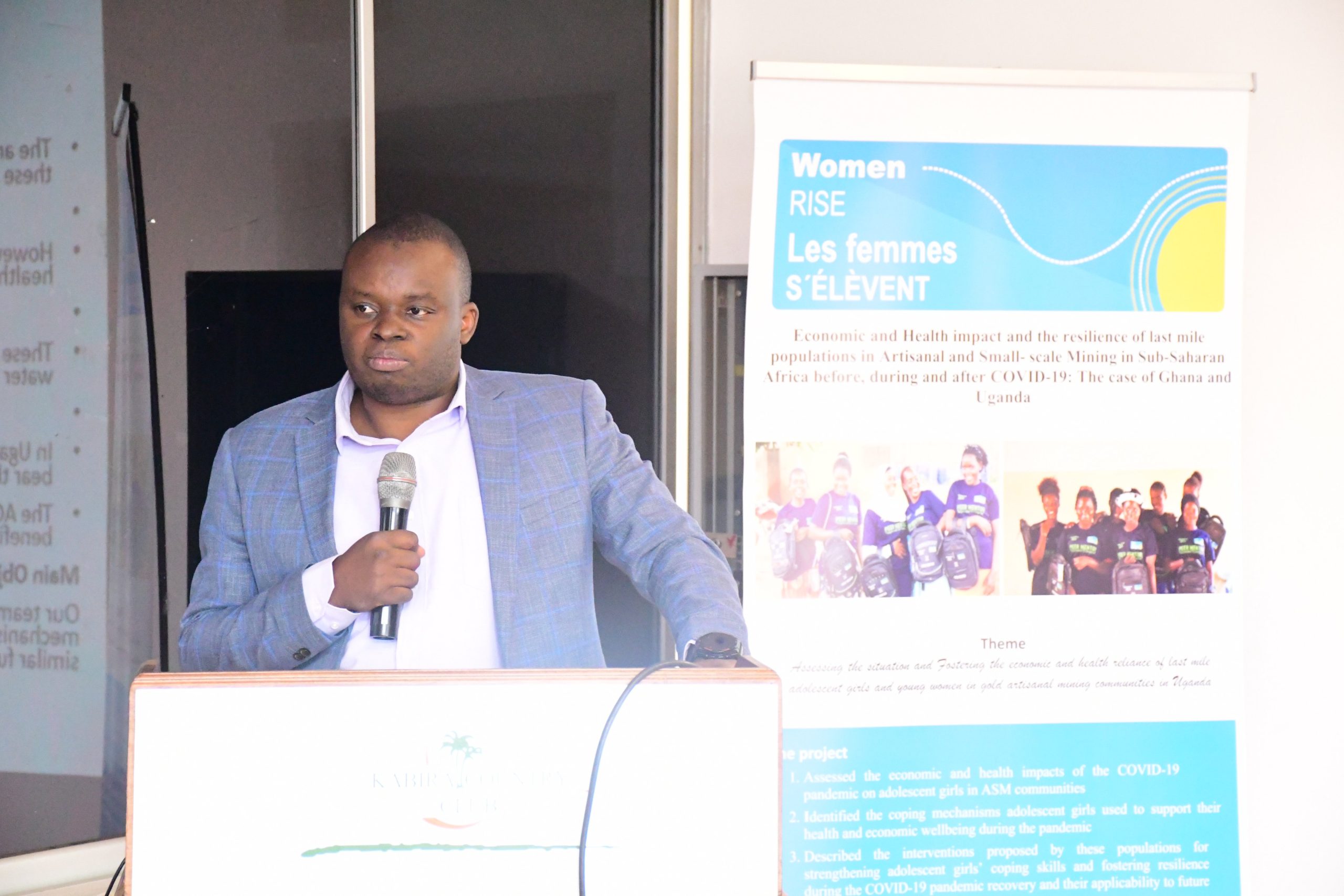
Dr. Wandera pointed out that miners in the Eastern region continue to use mercury, leading to the contamination of water sources. The health risks, he warned, extend beyond miners to entire communities, as contaminated water from mining sites drains into swamps where people cultivate rice and vegetables, posing a major public health threat.
“Mining runoff is contaminating both soils and water bodies. We visited a site where ore was being processed, and the wastewater was flowing directly into a swamp. Some of this water reached areas where people were growing rice and vegetables. As a result, these individuals will eventually consume crops contaminated by the runoff. This situation poses a significant disaster waiting to happen,” Dr. Wandera warned.
Dr. Wandera outlined key recommendations to mitigate risks in artisanal mining, including strengthening coordination with the Ministry of Health and integrating mental health support in affected areas. He stressed the importance of enforcing occupational health and safety regulations while working towards the sector’s formalization. Additionally, he advocated for establishing effective monitoring systems and conducting regular inspections to enhance mining safety. He also recommended equipping miners with resources on safer techniques and alternative technologies, implementing education and training programs on the dangers of mercury, and fostering multi-sectoral collaboration at national and local levels to address environmental, occupational, and public health concerns.
Dr. Miriam Mutabazi, Co- Investigator from Uganda Christian University presented critical findings on the health and well-being of young women in Uganda’s artisanal and small-scale mining (ASM) sector. She stressed the urgent need to address sexual and reproductive health challenges in these communities, emphasizing that economic vulnerability often compels young women to engage in high-risk behaviors, exposing them to significant health risks.
She noted that the study revealed a troubling trend where adolescent girls and young women engage in risky sexual practices, often in exchange for work opportunities, cash, or gold. “We realized that transactional sex and the temporal nature of relationships lead to multiple sexual partnerships, and this is very common in the mining settings. We also found that although the reports on sexual violence were low, interaction with the different participants revealed that there was actually a lot of gender-based violence, including sexual violence,” Dr. Mutabazi explained.
The findings indicated that 28% of the young women who had ever had sex had multiple sexual partners in the past year. These behaviors, she said, compounded by widespread substance abuse, have led to alarming rates of sexually transmitted infections (STIs), with 40% of respondents reporting STI transmission.
She highlighted that the most vulnerable young women for instance those with lower wages, limited economic opportunities, and histories of sexual violence—were at the highest risk of negative reproductive health outcomes. Despite the relatively high use of modern contraceptives at 69%, adherence remained a major challenge, with inadequate access to family planning counseling and education.
In response to these findings, Dr. Mutabazi called for urgent action to protect and empower young women in the mining sector. She emphasized the need for a multi-stakeholder approach involving government, NGOs, and local leaders to strengthen health services and education in mining communities. Among the key recommendations was the prioritization of artisanal miners as a high-risk population for STIs and HIV.
Dr. Mutabazi proposed a holistic intervention strategy that includes raising awareness on behavioral change, promoting alternative income sources to reduce transactional sex, preventing sexual violence, and advocating for safer sexual practices and committed relationships. She emphasized the need to expand access to youth-friendly reproductive health services, particularly through mobile clinics that reach young women directly at their workplaces. Additionally, she called for increased investment in family planning services, enhanced health education on the dangers of mercury exposure in mining areas, and the revitalization of a multi-sectoral approach that actively involves mining host communities.
Expounding on the health hazards, Prof. Betty Kwagala, an academic member of staff at Makerere University College of Business and Management Sciences informed the participants that most women in the mining areas carry their children to work, which also exposes the children to health and occupational risks.
Prof. Kwagala who is the Principal Investigator-Women RISE project noted that although the adolescent girls and young women faced health challenges, the most driver into this unfortunate scenario, were the economic factors.
She explained that when the adolescent girls and young women were trained and financially empowered through seed funding, the majority stopped going to the mining areas. “The adolescent girls and young women formed saving groups, became entrepreneurs, some went back to school, while others created alternative sources of income,” she said. In addition, the financially empowered adolescent girls and young women were able to transform their lives and children, uplift their families, friends and communities in general.
Presenting the gender dynamics in Artisanal and small-scale mining (ASM), as well as piloted interventions and their outcomes, Prof. Kwagala revealed that artisanal mining serves as an economic lifeline for many families across Uganda. She highlighted that these communities present significant challenges, particularly for young women and adolescent girls, who face gender-based disparities and reproductive health risks.
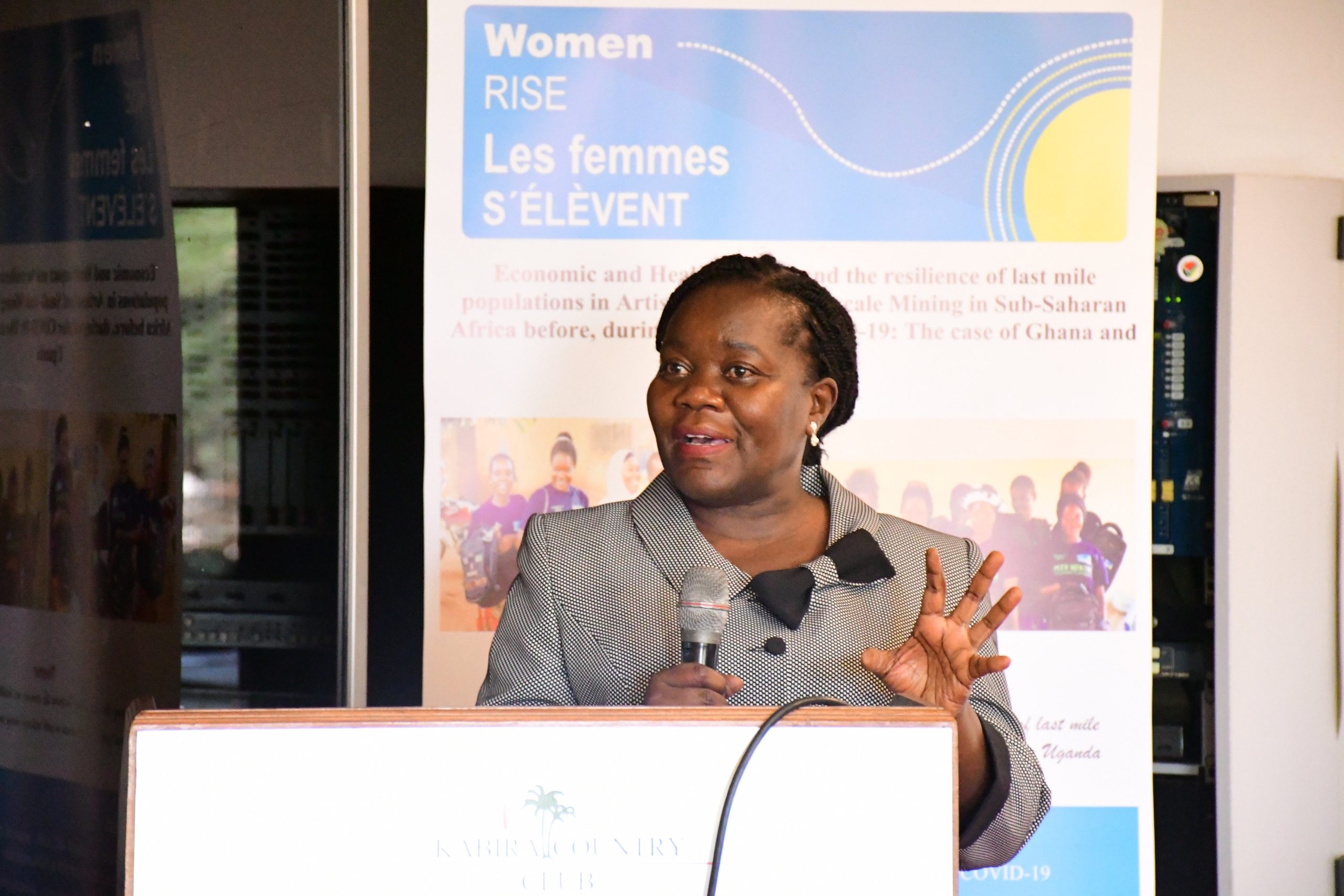
Despite their significant contributions, Prof. Kwagala said that women in artisanal mining remain marginalized. “Women are often relegated to low-paying and labour-intensive roles, such as panning and carrying ores, while men dominate the more lucrative aspects of mining. This limits women’s economic advancement and reinforces a cycle of poverty and dependence,” she said.
The findings revealed that, beyond economic marginalization, women in mining communities face an increased risk of gender-based violence. Their vulnerability is further aggravated by the absence of formal labor protections and legal recourse, highlighting the urgent need for policymakers and community leaders to take proactive measures to address these challenges.
Young women and adolescent girls in mining areas frequently encounter significant reproductive health risks. Limited access to healthcare services and inadequate sexual health education contribute to high rates of early pregnancies, unsafe abortions, and sexually transmitted infections (STIs), including HIV/AIDS. Additionally, sexual exploitation is prevalent, with many women subjected to coercion and harassment in exchange for economic survival.
As a result, Prof. Kwagala emphasized the urgent need for improved healthcare infrastructure and awareness campaigns to promote safe reproductive health practices. Strengthening access to contraception, maternal healthcare, and counseling services would be a pivotal step in addressing these challenges.
Another critical issue affecting young women in mining communities is the lack of educational opportunities. Prof. Kwagala disclosed that many adolescent girls drop out of school due to financial hardships, early pregnancies, or the need to contribute to household incomes. Without proper education and vocational training, they remain trapped in exploitative labour conditions with little hope for economic mobility.
To break this cycle, Prof. Kwagala called for community-driven initiatives that provide skills training, scholarships, and mentorship programs. Equipping young women with alternative income-generating skills can empower them to seek better economic opportunities beyond the mining sector.
Prof. Kwagala called for urgent action from the government, civil society, and private stakeholders to improve conditions for young women in artisanal mining. She recommended strengthening labor laws to ensure gender equity and protect women from exploitation, establishing mobile clinics and reproductive health education programs, and creating financial literacy and entrepreneurship initiatives to help women diversify their income. Additionally, she emphasized the need for gender sensitization programs to challenge harmful cultural norms and reduce gender-based violence. She also underscored the importance of advocating for increased resource allocation to adolescent and youth programs at all levels, supporting collaborative efforts to regulate excessive alcohol and drug abuse, establishing rehabilitation centers where feasible, and implementing interventions that engage male miners in promoting sexual behavior change and responsible parenthood.
Testimonies from adolescent girls and women empowered by the Women RISE project:
This being the end of the project dissemination, the participants listened to powerful testimonies from some of the adolescent girls and young women whose life was positively transformed through the Women RISE project. The transformation has had multiplier effects extending to uplifting the livelihoods of children, families and communities, where these girls and women conduct their work.
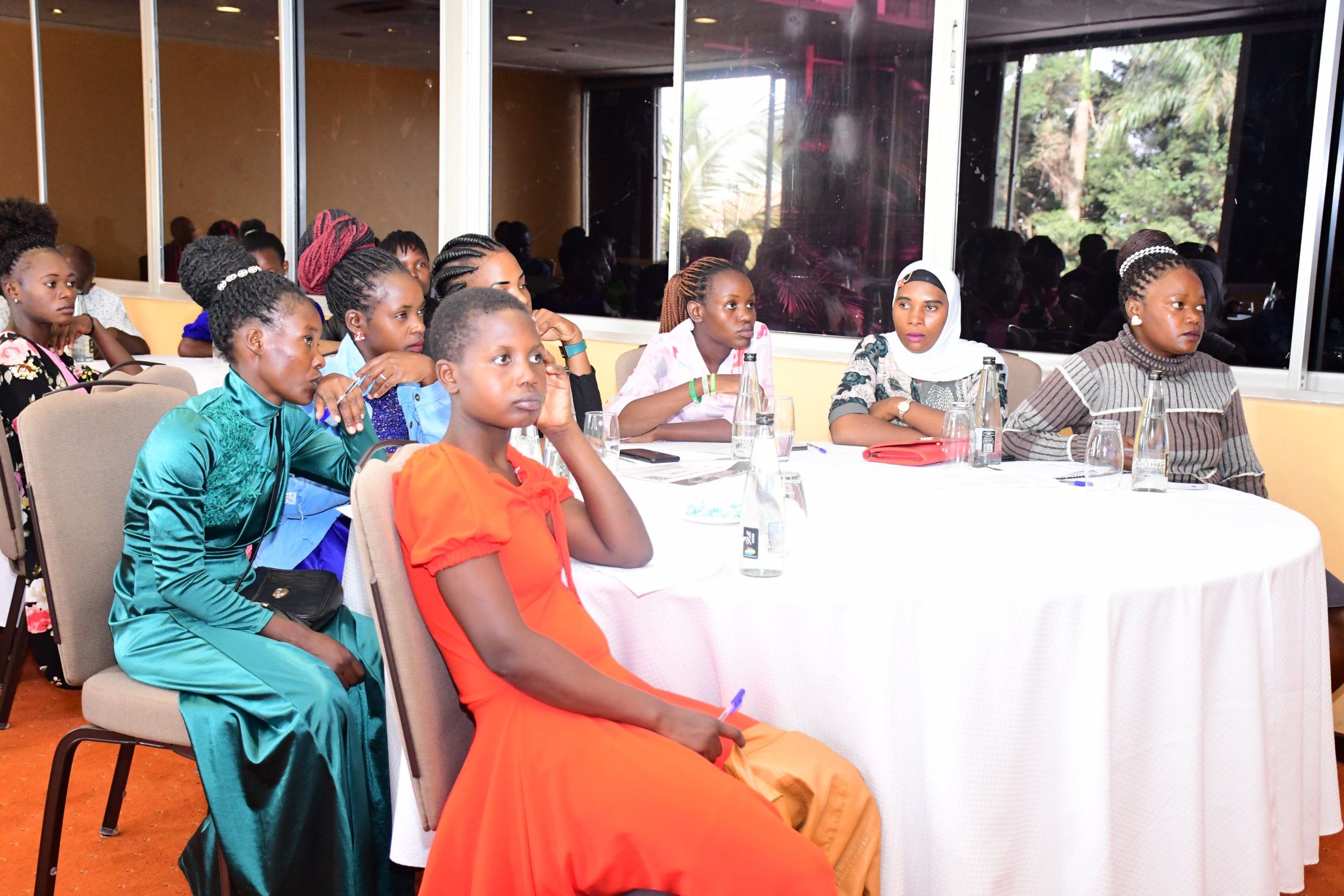
“We were monitored, trained in financial literacy and saving, entrepreneurship and equipped with life skills. We have created alternative sources of income. We have been transformed and empowered to lead better lives,” testified some of the adolescent girls and young women amidst applause from the stakeholders.
One participant emphasized that the support from partners and stakeholders is crucial for sustaining this momentum. It was disclosed that plans are already in place to expand the reach of the project, to integrate community health and education systems, and address new challenges that may arise in these rapidly growing districts.
Courtesy of the Women RISE project, the young people speak with confidence. They are in position to speak publicly and advocate for the needs of their peers. Many are making informed decisions about their lives, choosing to abstain from unprotected sex, using family planning methods, and making more assertive decisions about relationships. One participant mentioned, “I have learned that protecting my life is essential. I don’t go with anyone. I ask myself, ‘Who am I going with? What is his health status?”
Another young person shared, “This program changed my life. I was tested for HIV, and I am now confident in my decision not to engage with any man before knowing his status. Abstinence is my choice.”
What does this say about resilience? These young people have demonstrated remarkable growth and are now capable of standing resiliently in case of future crises. They have learned how to manage businesses, with many having multiple income streams. One notable success story is a young person who, after dropping out of school due to teenage pregnancy, financed her child’s delivery using proceeds from her business and she testified that she went back to school to complete her studies.
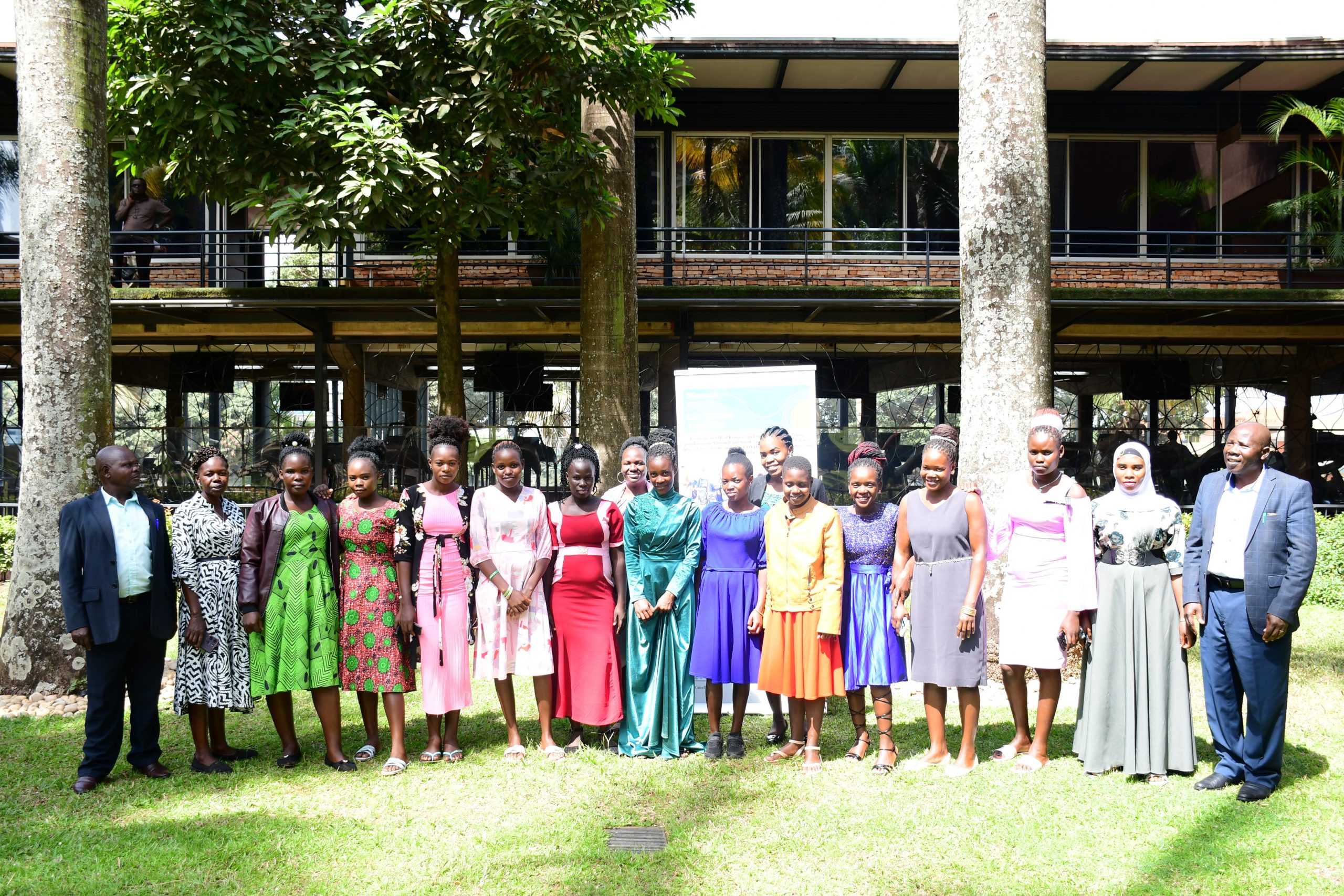
Peer mentorship has contributed to both personal and community resilience. Through these programs, young people have built self-esteem and empathy while advocating for others. One peer mentor said, “I have made many new friends. Even older people trust me, and I am able to help them, even escorting them to health facilities when necessary.”
Initiatives being undertaken by the Ministry of Gender, Labour and Social Development:
Addressing the stakeholders, Mr. Fred Ngabirano, Commissioner for Youth and Children Affairs at the Ministry of Gender, Labour and Social Development highlighted the power of grassroots transformation in fostering economic and social development.
He emphasized the commitment of the Government of Uganda to addressing social challenges and creating sustainable opportunities for young people and women in vulnerable sectors. He said that among the various initiatives under the Ministry’s mandate is the Juakali Center, which plays a crucial role in identifying and supporting women and young people in their economic journeys. “Once we organize groups of young people, we collaborate with Juakali to provide them with opportunities,” he explained.
As the project beneficiaries shared their transformational experiences, Mr. Ngabirano highlighted key lessons drawn from their testimonies. He emphasized that transformation is not solely reliant on financial aid, but rather on effective strategic planning, capacity development and resource management.
“Some individuals have received venture capital funds such as Youth Livelihood Programme, but have not made significant progress. This raises an important question—what is the key to success? The answer lies in effective financial planning and passion-driven work; it is about how well you plan and utilize what you have,” he remarked.
The Commissioner emphasized the importance of passion in professional and entrepreneurial success, saying, “If someone lacks passion for what they do, no amount of facilitation will drive success.” He thus lauded the young entrepreneurs who have followed their passion—whether in hairdressing, the grocery business, or other trades—and have, as a result, seen remarkable progress in their endeavors.
Mr. Ngabirano called for prioritizing human resource development as a means to transform people. He elaborated that investing in developing human potential should be a key focus. As the government continues to collaborate with academic institutions and grassroots organizations, Mr. Ngabirano stated that the future of youth and women empowerment remains promising.
Strategies being undertaken by the Ministry of Health:
Dr. Allan Kasozi from the Division of Adolescent Health at the Ministry of Health highlighted the pressing health challenges faced by young people, particularly those engaged in artisanal mining. He stressed the urgent need for targeted interventions to protect vulnerable youth working in hazardous conditions. Dr. Kasozi revealed that the Ministry of Health is finalizing the Adolescent Health Hosted Implementation Plan, a comprehensive strategic document that will guide adolescent health policies and interventions for the next five years. He underscored the importance of targeted service delivery, ensuring that healthcare efforts effectively reach both remote areas and the most at-risk populations.
Dr. Kasozi expressed his deep appreciation for the resilience and hard work of all stakeholders involved in the Women RISE project research, acknowledging the critical insights it has provided. He emphasized that while policymakers may not always have the opportunity to closely observe the daily realities of young miners, this research has shed light on crucial issues that demand immediate attention.
“The findings from this study, alongside the voices of young people, have been incredibly enlightening. These insights will play a pivotal role in shaping our strategies at the Ministry of Health to effectively tackle the challenges faced by adolescent populations, particularly those in vulnerable sectors like artisanal mining,” he stated.
He credited the project research team for their invaluable contributions, noting that their work provides vital evidence to inform better health planning for Uganda’s youth. “This research presents an opportunity for us to lead with informed solutions. It reinforces the need for a multi-faceted approach to adolescent health, ensuring that young people, regardless of their circumstances, receive the care and support they need.”
Contribution from the Ministry of Local Government:
Mr. Rashid Biruma from the Ministry of Local Government who represented the Commissioner for Local Council Development, Mr. Swizin Mugyema stated the critical role of research in addressing national challenges. He acknowledged the existence of numerous problems facing the country and highlighted that the identification of specific issues through research is crucial in finding solutions. He noted that the workshop had provided valuable insights into the scale of the challenges, which extend beyond the specific areas being discussed.
One major issue raised during the workshop was the problem of child labour in mines. Mr. Biruma referred to this as a significant concern, particularly due to its association with crimes and children in conflict with the law. He praised the Ministry of Labour, Gender, and Social Development for its efforts in rehabilitating children involved in such activities, particularly through diversion programs aimed at reintegrating them into society.
“Child labour is associated to various related issues, including crime and children in conflict with the law. This is a critical issue that requires urgent attention, and we must explore ways to address and redress it. We are grateful for the support from the Ministry, which is assisting us, particularly through diversion programs aimed at rehabilitating children involved in criminal activities,” he said.
In addition to tackling child labour, Mr. Biruma highlighted the importance of leadership, particularly at the local government level. He reiterated that the Ministry of Local Government would continue ensuring compliance with legal frameworks and enforcement of rights.
Education, both formal and civic, was another point of emphasis. He encouraged the use of established community structures to promote civic education, stressing that awareness and community engagement are crucial to the success of these initiatives. He also urged the dissemination of information to local government officials to ensure compliance with community engagement strategies.
Presentation of findings on sexual behaviours of young male artisanal miners in Kassanda District:
In a study conducted by Ms. Patience Natwijuka, a Master of Science student funded by the project and her team at Makerere University, critical insights have been revealed regarding the sexual behaviors and factors influencing consistent condom use among adolescent and young male artisanal miners in Kassanda District, Central Uganda. The research, which focused on mining sites in Kagaba and Kayonza, sheds light on the health risks faced by this vulnerable population and highlights the urgent need for targeted interventions.
The study, which involved a survey of 304 male participants aged 15 to 24 years, sought to assess sexual activity, multiple sexual partnerships, transactional sex, and socioeconomic determinants affecting condom use. The findings paint a stark picture of the realities young miners face, emphasizing the intersection of economic vulnerability, risky behaviors, and health outcomes.
One of the most alarming findings was that the median age of first sexual intercourse among these young miners was 16 years. On average, they reported having 16 lifetime sexual partners, with around 8 sexual partners in the last 12 months alone. Such patterns of sexual activity significantly heighten the risk of sexually transmitted infections (STIs) and HIV, raising concerns about the well-being of these young workers.
The study revealed that 24% of respondents had contracted an STI in the past year, while 55% engaged in multiple sexual partnerships. Additionally, 11% reported involvement in transactional sex, where economic hardships often push them into high-risk relationships. Compounding the risks, 56% of the adolescents reported alcohol use, a factor known to impair judgment and contribute to risky sexual behaviors.
A deeper analysis of the factors affecting consistent condom use revealed that marital status and parental survival played significant roles. Married or cohabiting young miners were less likely to use condoms consistently compared to their single counterparts. The findings highlighted the need for strategies to ensure that all young people irrespective of survival status of parents, receive guidance on safer sex.
Given these findings, Ms. Natwijuka and her research team strongly recommend the implementation of comprehensive health education programs in mining areas. These programs should focus on raising awareness about HIV, STIs, and the importance of condom use among young artisanal miners. Her study serves as a wake-up call to all stakeholders, urging collaborative efforts to safeguard the well-being of young artisanal miners and mitigate the rising health crisis in Uganda’s mining communities.
Way Forward:
Prof. Kwagala shared that education remains a key pillar in the discussions, with a strong focus on empowering adolescent girls and boys in mining districts. Notably, districts such as Kassanda have made significant strides by offering vocational training opportunities, equipping young people with practical skills for a sustainable future. These initiatives have enabled many, particularly those from disadvantaged backgrounds, to return to school or enroll in vocational institutions, providing them with viable alternatives beyond the mining industry and fostering long-term economic empowerment.
While the challenges remain, the commitment from district leaders to continue building on the project’s successes is clear. One participant emphasized that the support from partners and stakeholders is crucial for sustaining this momentum. Plans are already in place to expand the reach of the project, to further integrate community health and education systems, and address new challenges that may arise in these rapidly growing districts.
In Kassanda, for example, district leaders are focused on ensuring that more adolescent girls and boys have access to the resources they need to succeed. With the involvement of more partners and stakeholders, including local schools, health facilities, and NGOs, there is confidence that the district will continue to make progress in addressing the needs of its young people.
Prof. Kwagala emphasized that an integrated, community-driven approach is key to addressing mining community challenges. She noted that peer mentorship and education are empowering youth to advocate for safer practices and healthier lifestyles. While challenges remain, she highlighted the collective effort of local leaders, project partners, and youth as a model for lasting change. With continued commitment, the project aims to create a lasting impact, fostering healthier and more resilient generations.
She noted that outreach efforts to schools are underway to address the alarming dropout rates among girls, many of whom face early pregnancies, mining work, or repeated pregnancies. Prof. Kwagala highlighted that some girls become pregnant as early as 12 years old, stressing the urgency of interventions to create better opportunities for them.
Prof. Kwagala explained that several initiatives are in place to keep girls in school. For instance, peer mentors in Kassanda have reached out to 720 pupils. These provide age-appropriate education on menstrual hygiene, abstinence, and other essential health topics. The impact on schools has been ignificant, with peer educators playing a key role in engaging parents as well and in guiding children to health facilities for necessary services.
Prof. Kwagala highlighted the vital role of private-public partnerships in the program’s success, where partnership with an NGO and public health facility providers in partnership with trained peer mentors, through outreach or mobile clinics facilitated delivery of services like counseling, PEP, contraceptives, STI testing, HIV testing, and ARVs. This has led to increased service utilization and referrals among young people, fostering trust in these resources. She also emphasized the importance of mobile clinics in reaching remote communities with limited access to healthcare. These clinics have successfully built trust and confidence, offering a more accessible and reliable healthcare option.
You may like
-


Over 9,200 to graduate at Makerere University’s 76th Graduation
-


76th Graduation Highlights
-


Mak Selected to Host Alliance for African Partnership Africa Office
-


Meet Najjuka Whitney, The Girl Who Missed Law and Found Her Voice
-


Makerere University School of Public Health Graduates First Cohort of Cost-Effectiveness Analysis Short Course
-
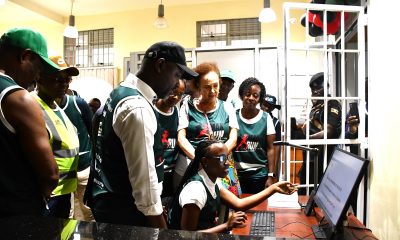

Students empowered to thrive through the Semester
Business & Management
Climate variability found to shape malaria trends in Yumbe District
Published
4 days agoon
February 20, 2026
A new study led by scientists from Makerere University School of Public Health has demonstrated that short-term climate variability plays a significant role in malaria transmission in Yumbe District, West Nile sub-region of Uganda. The study, Climate variability and malaria incidence trends in Yumbe District, West Nile Sub-region of Uganda (2017–2021), by Lesley Rose Ninsiima, Rogers Musiitwa, Zaitune Nanyunja, James Muleme, Chris Maasaba, Twahiri Anule, and David Musoke, was published in February 2026 in Malaria Journal through Springer Nature Link.
Today, malaria remains a major public health burden in Uganda, where environmental conditions support sustained transmission. Despite persistent outbreaks in northern Uganda, limited local evidence exists on how the changing climate patterns influence malaria trends. This study addressed that gap by examining five years of malaria surveillance data alongside district-level rainfall and temperature records.

Using routine health facility reports from the District Health Information System (DHIS) and climate data from the Uganda National Meteorological Authority (UNMA), the researchers applied time-series analysis to assess seasonal patterns and delayed climate effects on malaria incidence. Between 2017 and 2021, Yumbe District recorded 2,066,711 malaria cases, with transmission showing clear seasonal peaks between May and July and September and November, aligning with rainy periods.
Their analysis showed that rainfall was the strongest climatic driver of malaria transmission. Increased rainfall was associated with higher malaria cases approximately one month later, reflecting the time needed for mosquito breeding and transmission cycles. In contrast, higher minimum temperatures were linked to reduced malaria incidence, while maximum temperature showed no significant effect. Together, rainfall and minimum temperature explained a substantial proportion of variation in malaria cases, highlighting malaria’s sensitivity to short-term climate fluctuations.
The study findings underscore the value of integrating climate information into malaria surveillance and early warning systems to anticipate transmission peaks and guide timely interventions. Strengthening collaboration between public health and meteorological sectors, the researchers argue, could improve preparedness and support climate-informed malaria control strategies in high-burden settings.
Further details: https://link.springer.com/article/10.1186/s12936-026-05824-0
Agriculture & Environment
Mak hosts First African Symposium on Natural Capital Accounting and Climate-Sensitive Macroeconomic Modelling
Published
4 days agoon
February 20, 2026
African economies are increasingly exposed to climate-related shocks that threaten development gains, fiscal sustainability, and macroeconomic stability. From extreme weather events and biodiversity loss to the depletion of natural capital, climate risks are reshaping economic realities across the continent. Yet many macroeconomic frameworks used in public finance and planning continue to overlook climate and nature-related risks and the long-term benefits of resilience and adaptation investments.
To address this emerging reality, over 250 participants from Africa, Europe and beyond, convened at Makerere University – Kampala, on the 12th and 13th of February 2026, to participate in the First African Symposium on Natural Capital Accounting and Climate-Sensitive Macroeconomic Modelling.
Following the theme, “Climate-Sensitive Macroeconomics: Rethinking Growth in Africa’s Natural Resource Base, the hybrid symposium organized by Makerere University through the Centre of Excellence for Africa Climate-Sensitive Macroeconomic Modelling (CEACM) within the School of Economics, under the College of Business and Management Sciences (CoBAMS), the Environment for Development Initiative (EfD), and the Ministry of Finance, Planning and Economic Development (MoFPED) in Uganda, brought onboard ministers, leading economists and planners, researchers, policy makers, the academia, development partners, climate change experts and the media.
The Symposium being the first of its kind on the continent, reflected Africa’s growing determination to work collectively in confronting shared development challenges, building on recent momentum such as the formation of Pan-African Finance Ministers Forum for Climate Action (PAFMCA).
Featuring speeches and presentations from notable speakers and partners, a keynote address on Natura Capital Accounting and Climate Change Nexus in Africa and their impact on Fiscal Policy, panel discussions, expert opinions, and exhibition kiosks (World Café), the symposium presented a platform to strengthen Africa’s analytical and institutional capacity to integrate climate and natural capital considerations into macroeconomic and fiscal policy.
Vice Chancellor underscores the role of universities
Welcoming the delegates to Makerere University, the Vice Chancellor-Prof. Barnabas Nawangwe emphasized that universities must lead innovation and collaborative research efforts to support collective climate change mitigation across the continent.
In the same vein, he advocated for strong collaboration between universities in Africa and government Ministries. “Makerere’s collaboration with the Ministry of Finance, Planning and Economic Development, stands as a shining example of how academia and government can strengthen economic management,” he said.

Prof. Nawangwe revealed that the collaboration between Makerere University and the Ministry, has strengthened macroeconomic modelling, fiscal policy analysis, and technical capacity within government. In addition, the partnership led to the establishment of the Centre of Excellence for Africa Climate-Sensitive Macroeconomic Modelling, bridging academic scholarship with real-world policy application.
“We have jointly established the Centre of Excellence for Africa Climate-Sensitive Macroeconomic Modelling. The Centre (established in August 2025) is anchored within the School of Economics in the Department of Policy and Development Economics, under the Master of Science in Economic Policy and Investment Modelling, a program jointly facilitated by Makerere University, the Ministry of Finance, Planning and Economic Development and the Bank of Uganda,” he mentioned.
Climate and Economic transformation are inseparable
The Vice Chancellor highlighted the critical intersection between economic transformation and environmental sustainability, noting that economies in Africa, heavily dependent on natural resources, face unprecedented pressures from climate shocks, biodiversity loss, and environmental degradation. Convinced that economic growth cannot be pursued in isolation from climate and environmental realities, he stressed the importance of integrating natural capital accounting and climate considerations into national development strategies.
Prof. Nawangwe advocated for shared responsibility of universities, research institutions, and policymakers to develop innovative analytical tools, responsive policy frameworks, and strong institutional capacities that promote sustainable growth while safeguarding environmental assets for future generations.
The Vice Chancellor commended UN PAGE and the Global Green Growth Institute (GGGI) for funding the symposium, as well as, other stakeholders namely the European Union and the Coalition of Finance Ministers for Climate Action (CoFMCA), Ministry of Water and Environment (MoWE), National Planning Authority (NPA), Uganda Bureau of Statistics (UBOS), the National Environment Management Authority (NEMA) for being reliable partners.
Integrating Climate into Fiscal Policy
During the opening ceremony, the Minister of Finance, Planning and Economic Development, Hon. Matia Kasaija underscored the urgency of embedding climate considerations into economic planning.
“As Ministers of Finance, we are often confronted with difficult trade-offs. Our task is to balance the needs of today with sustainability for future generations,” said Hon. Kasaija, in a speech read by Hon. Henry Musasizi, the Minister of State for Finance (General Duties).

The Minister guided that traditional macroeconomic models focusing only on growth, inflation, and fiscal balance are inadequate in an era of climate shocks. He affirmed that African economies are facing interconnected challenges which directly impact economic growth. He stressed that traditional macroeconomic frameworks must evolve to systematically incorporate environmental degradation and climate shocks, whose consequences can no longer be ignored in policy analysis.
“For countries such as Uganda, whose development prospects are closely linked to natural resources and the climate-sensitive sectors, these challenges are not abstract. They affect livelihoods, public finances and long-term economic resilience,” he mentioned.
The Minister emphasized that natural capital accounting and climate-sensitive macroeconomic modelling are vital for valuing natural assets, assessing environmental costs, and guiding sound investment decisions.
Protecting Africa’s Natural Capital
Hon. Beatrice Atim Anywar, Minister of State for Environment, emphasized the urgent need to protect Africa’s ecosystems. “Africa stands at a defining crossroads. Our economies remain anchored in natural capital—forests, water resources, biodiversity, land, and ecosystems—which sustain life, generate fiscal revenue, and underpin development,” she said.
She warned that climate-related shocks are already undermining growth and public investment. “Floods, droughts, land degradation, biodiversity loss, and water stress are no longer distant risks. They are present realities, already affecting productivity and macroeconomic stability,” she said.
She emphasized the need for improved economic models that account for environmental and climate risks: “Traditional macroeconomic frameworks have not adequately captured climate risks or the long-term economic benefits of resilience and adaptation. This limits our ability to make informed policy decisions as Africa pursues economic transformation, energy security, and fiscal stability,” she stated.
Hon. Anywar highlighted collaboration with GIZ, Makerere University, and government ministries, which led to the development of the MONCAP (Model for Natural Capital Policy Assessment). “This tool is being used to assess natural capital assets for climate change, energy transition, and their linkages to the macroeconomy. It supports budgeting by estimating the cost of depleted natural capital assets,” she said.
“Water security, forest conservation, ecosystem restoration, and climate adaptation are not costs. They are investments in Uganda’s long-term economic stability, productivity, and prosperity.”
Stakeholders urged to transform climate threats into opportunities
Adam Sparre Spliid, the Deputy Head of Mission, Danish Embassy said: “Integrating climate risk and natural capital into our macroeconomics frameworks is not only academic exercise, it is a massive de-risking strategy for private investment. By bridging the gap between government policy and planning, academia and research, and the private markets, we transform climate threats into tangible opportunities.”
Sustainability includes youth, jobs and human well-being
Dr. Steven Stone, Chair of the UN PAGE Management Board, emphasized that sustainability extends beyond the environment to encompass youth, jobs, economic growth, and human well-being. “While the environment is Africa’s foundational source of wealth, sustainable development requires balancing ecological stewardship with economic progress, including income and employment for the youth which are critical priorities for countries such as Uganda.”
Dr. Stone highlighted that UN PAGE, originating from the Rio+20 Conference, supports climate-sensitive economic policy in Africa, emphasizing that dialogue, scenario-building, cross-sector collaboration, and strong partnerships are key to advancing sustainable, inclusive, and climate-resilient development.
Africa’s Wealth Declining
In the keynote address titled, Natural Capital Accounting and Climate Change Nexus in Africa and their Impact on Fiscal Policy, Paul Jonathan Martin, Manager of Environmental Operations at the World Bank for Eastern and Southern Africa, and a specialist with over 30 years in climate and natural resources, warned that Africa’s overall wealth is under threat due to declining renewable natural capital.
“Produced capital has increased by 20%, human capital by a third, but renewable capital has declined by 30%,” Martin said. “When combined, Africa’s overall wealth trajectory has been weakening since 2010.”
He stressed that natural resources must be treated as economic assets requiring systematic accounting: “Africa’s rich natural resources are fundamental for sustainable development,” he said.
Citing examples from Ethiopia and Kenya, he highlighted successful integration of natural capital into public investment and budget decisions. “In Ethiopia, there are payments for ecosystems and investment prioritization tools. In Kenya, natural capital accounting integration into budgets has strengthened public investments. Climate change has deep, cascading effects across sectors, but Africa has major potential to lead climate solutions,” he said.

Martin also highlighted the economic benefits of climate adaptation: “From 2020–2050, the cumulative effect of adaptation on Uganda’s GDP is positive. Without action, under a dry/hot climate future, GDP could significantly deviate from projected growth paths.”
Drawing on insights from over 70 country climate and development reports produced by the World Bank, the keynote speaker highlighted the profound macroeconomic impacts of climate change across Africa. He stressed the importance of integrating climate and natural capital into macroeconomic planning. He noted that Africa’s forests, water systems, and biodiversity are vital for sustainable development but face growing threats from climate change, environmental degradation, and climate-related disasters that undermine productivity, public investment, and economic stability.
He observed that traditional macroeconomic models often fail to capture the value of natural assets and regulating ecosystem services, which are critical to both economic stability and resilience but are largely excluded from GDP calculations.
Africa-Led Solutions
Prof. Edward Bbaale, Principal, College of Business and Management Sciences (CoBAMS), stressed the importance of developing African-led solutions. “We need to champion the Africa-led model. We need approaches that fit our unique context. Africa is not here to take in other frameworks blindly,” he said.
By supporting research, training, policy dialogue and modelling innovation, the Centre of Excellence for Africa Climate Sensitive Macroeconomic Modelling (CEACM) positions Makerere University as a regional hub for advancing climate-sensitive macroeconomic policy across Africa.
He highlighted CEACM’s capacity-building programs: “Our goal is to ensure African Ministries of Finance have home-grown expertise to integrate climate and natural capital considerations into fiscal and macroeconomic policy. This is critical for long-term resilience and sustainable development,” he said.
The Principal explained that establishment of independent research centres enables Makerere University to go beyond traditional academic instruction and focus deeply on societal challenges, particularly those related to climate change, environmental degradation, and biodiversity loss.

He reported that the Centre of Excellence for Africa Climate-Sensitive Macroeconomic Modelling is structured to advance methodological innovation, develop new data systems, and strengthen climate-sensitive macroeconomic tools that are tailored to the African context.
MONCAP Model for Policy Assessment
Dr. Peter Babyenda, a member of faculty at CoBAMS, demonstrated MONCAP (Model for Natural Capital Policy Assessment), which integrates climate and natural capital variables into fiscal and macroeconomic planning.
“MONCAP allows policymakers to estimate the economic cost of depleting natural assets such as forests, wetlands, and water resources. It helps simulate policy options and determine how investments in natural capital yield long-term benefits,” Babyenda said. “We came up with this model to aid the Ministry of Water and Environment. This model is open—you can extend it,” he added.

He highlighted capacity-building initiatives, including short courses and the Master of Science in Macroeconomic and Investment Modelling, designed to train economists to incorporate natural capital and climate into policy planning.
International Perspectives
Sweetman Liam, Ireland’s Finance Minister, highlighted the economic value of ecosystems: “There is a deeper value of landscapes in flood prevention and biodiversity. Decision-making was informed, and people started understanding economic value,” he said.
Prof. Chukwuone Nnaemeka of the University of Nigeria emphasized collaboration with national statistical agencies: “We coordinate with the National Bureau of Statistics to develop natural capital accounting metrics. Increase the use of Natural Capital Accounting in decision-making,” he stated.
Technical and Parallel Sessions
The afternoon session featured three parallel sessions focusing on Natural Capital Accounting Methodologies and Best Practices, Climate-Sensitive Fiscal and Economic Modelling, and Natural Capital Accounting and Model Uptake and Use.
Drawing on diverse expertise, the panels highlighted innovative approaches and demonstrated that natural capital is not an environmental afterthought, but a central pillar of sustainable economic and policy planning.
The first day of the African Symposium drew to a close with interactive exhibitions at the World Café, where case studies and practical demonstrations highlighted innovative approaches to integrating climate and natural capital into economic planning. Participants actively engaged in discussions and networking, forging collaborations that promise to advance climate-sensitive fiscal and development strategies across Africa, setting a strong and optimistic tone for the days ahead.
Business & Management
First African Symposium underscores the role of the Centre of Excellence for Africa Climate-Sensitive Macroeconomic Modelling
Published
6 days agoon
February 18, 2026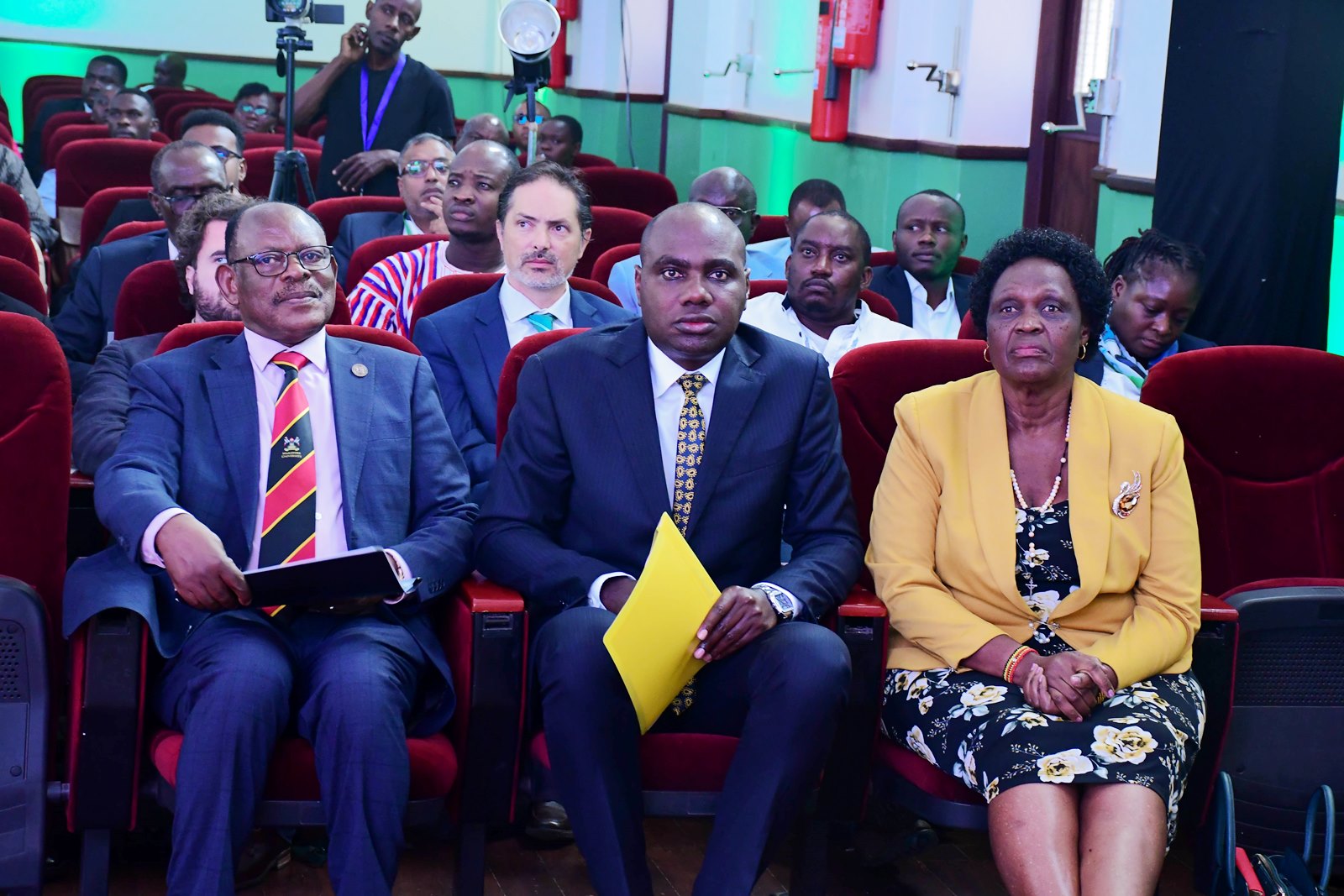
During the First African Symposium on Natural Capital Accounting and Climate-Sensitive Macroeconomic Modelling held on 12th and 13th February 2026 at Makerere University-Kampala, notable speakers and experts urged government ministries and universities to initiate institutionalized approaches and frameworks to mitigate the natural capital account threats in Africa.
The discourse centred on the theme, Climate-Sensitive Macroeconomics: Rethinking Growth in Africa’s Natural Resource Base, which explored innovative approaches to integrate natural capital and climate risks into economic planning. The symposium highlighted that Africa’s economic transformation must be climate-informed and resilience-driven.
Committed to African-led capacity building, Makerere University is taking the lead in engaging other African universities to support fiscal policy in climate change modelling and analysis.
The participants and stakeholders across the globe lauded Makerere University, for partnering with the Ministry of Finance, Planning and Economic Development (MoFPED), and the Environment for Development Initiative (EfD), to establish the Centre of Excellence for Africa Climate-Sensitive Macroeconomic Modelling (CEACM).
Highlights about the CEACM
During the symposium, the Vice Chancellor of Makerere University-Prof. Barnabas Nawangwe, the Principal, College of Business and Management Sciences-Prof. Edward Bbaale, the Dean of the School of Economics-Associate Professor Ibrahim Mike Okumu, Dr. Peter Babyenda, Dr. Wilson Asiimwe and other members of faculty, articulated the mandate of the CEACM.
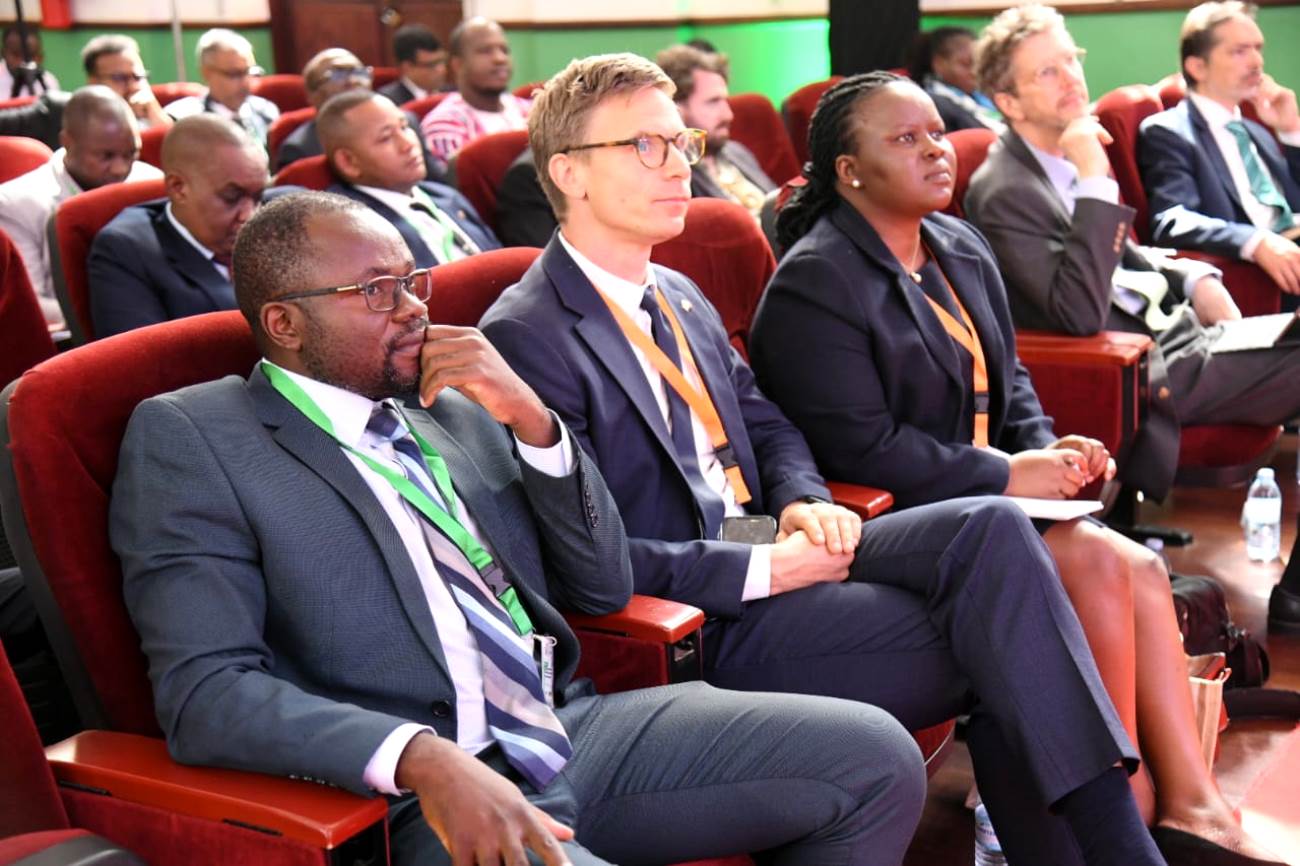
Situated at Makerere University, CEACM is anchored within the School of Economics in the Department of Policy and Development Economics, under the College of Business and Management Sciences. It is aligned with the Master of Science in Economic Policy and Investment Modelling, a program jointly facilitated by Makerere University, the Ministry of Finance, Planning and Economic Development and the Bank of Uganda.
Promotion of Africa-led Modelling
Addressing the participants, the University leadership and faculty, highlighted the Centre’s strong commitment to Africa-led modelling, as its key distinguishing feature.
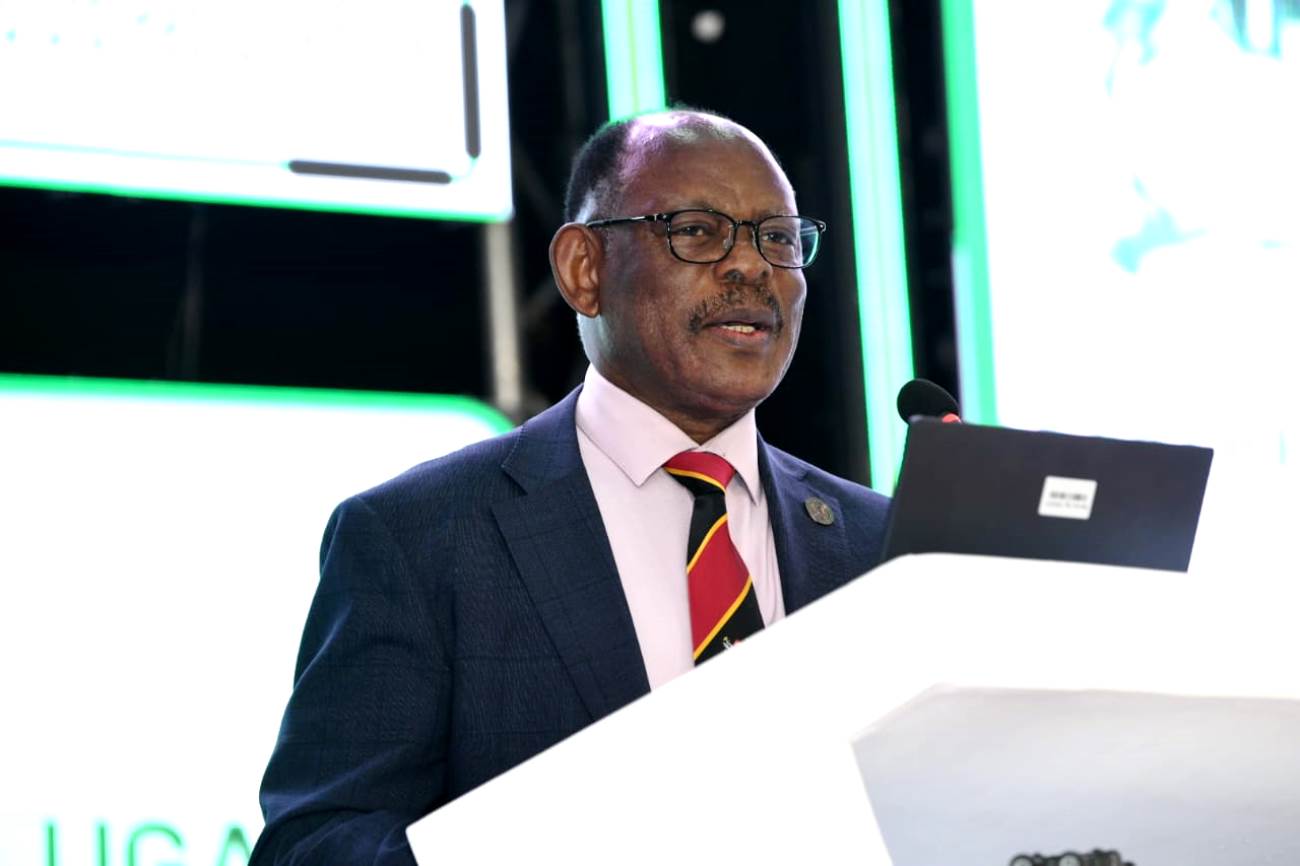
According to Prof. Nawangwe, the Centre of Excellence for Africa Climate-Sensitive Macroeconomic Modelling-is a strategic initiative addressing Africa’s climate, environmental, and fiscal challenges.
Citing Africa’s unique economic realities such as heavy reliance on natural capital, widespread informality and heightened vulnerability to climate shocks, the Centre prioritizes the development of analytical frameworks that are rooted in local contexts rather than merely adapting externally developed models. This approach ensures that policy interventions, recommendations, and investment strategies are firmly grounded in the specific economic, environmental, and social dynamics of African countries.
University-Government collaboration to safeguard Africa
The Vice Chancellor stated that the Centre builds on a strong partnership between Makerere University and the Ministry of Finance, Planning and Economic Development (MoFPED), creating a direct bridge between academic training and real-world policy application. Through this structure, the Centre is preparing a new generation of economists equipped to embed climate considerations into macroeconomic analysis and public financial management.
“Our collaboration with the Ministry stands as an example of how academia and government can work together to strengthen economic management. This partnership has advanced macroeconomic modelling capacity, supported fiscal policy analysis, strengthened public investment management systems and enhanced training for economists and planners across government institutions,” he said.
Prof. Nawangwe observed that African economies remain deeply dependent on natural resources for livelihoods, public revenues and structural transformation, yet these resources are under increasing stress from climate shocks and ecological decline. In this context, he noted that economic transformation can no longer be pursued in isolation from environmental sustainability. The Centre was therefore established to strengthen analytical tools, policy frameworks and institutional capacities that integrate climate risks, natural capital accounting and long-term fiscal resilience into macroeconomic modelling.
He noted that the Centre strengthens Uganda’s contribution to continental and global climate finance and policy platforms, including the Coalition of Finance Ministers for Climate Action (CFMCA) and the Pan-African Coalition of Finance Ministers on Climate Action (PAFMCA). By supporting research, training, policy dialogue and modelling innovation, the Centre positions Makerere University as a regional hub for advancing climate-sensitive macroeconomic policy across Africa.
Capacity-Building Support for Climate and Nature-Resilient Economic Policies
Tackling the role of universities in Climate Fiscal Policy, Prof. Bbaale commended the strong collaboration between Makerere University and government through the Ministry of Finance, Planning and Economic Development, which provides a platform for academia-policy interface.
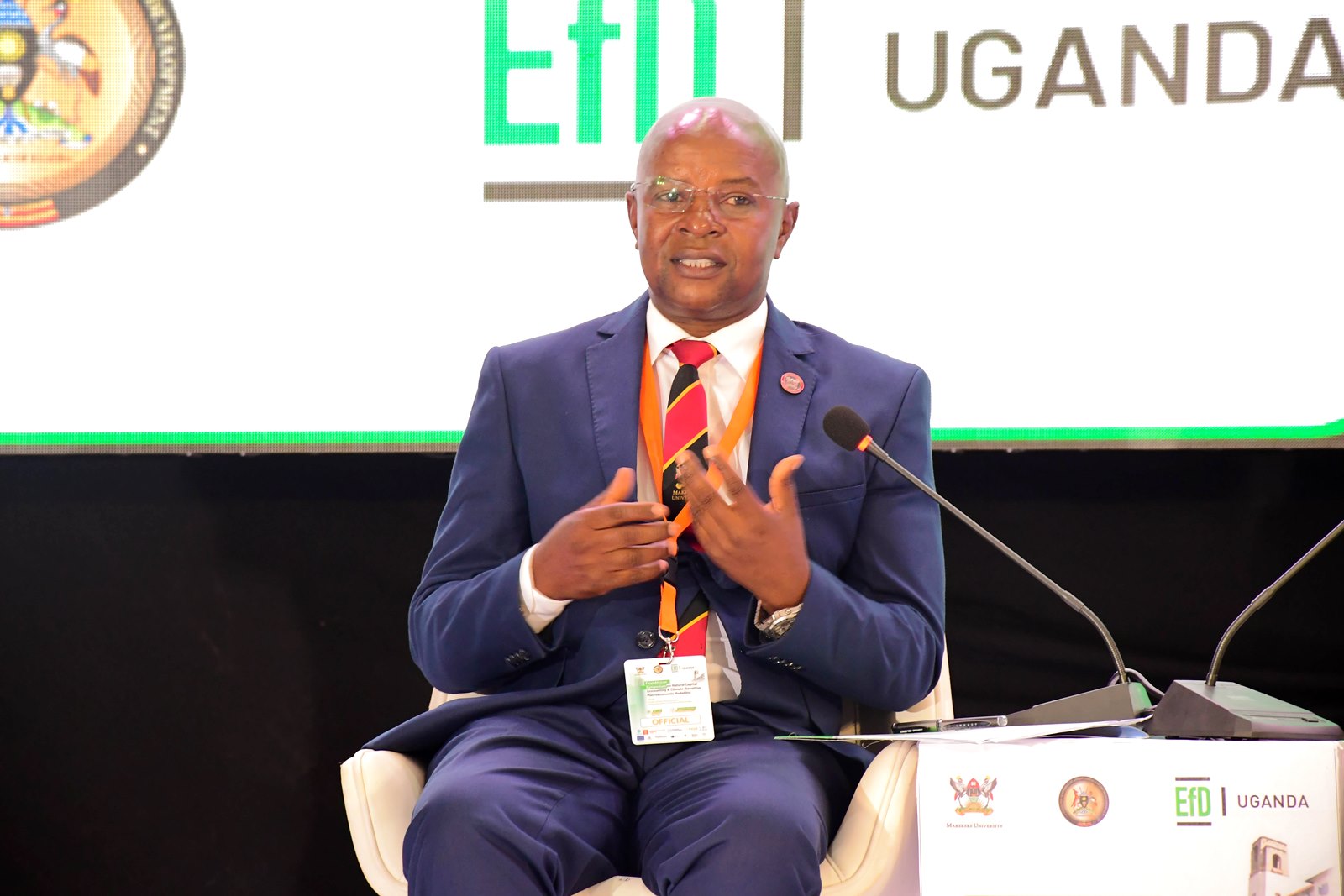
Additionally, the partnership of Makerere University, the College of Business and Management Sciences (CoBAMS), the Environment for Development Initiative (EfD), the Centre of Excellence for Africa Climate-Sensitive Macroeconomic Modelling (CEACM), with the Ministry of Finance, Planning and Economic Development (MoFPED), positions the University, as an active technical partner to the Coalition of Finance Ministers for Climate Action (CFMCA).
Academic training, research and policy engagement
Firmly grounded in Makerere University’s three core pillars of academic training, research, and policy engagement, the Centre brings these pillars to life by equipping students and practitioners with robust analytical skills, producing rigorous and policy-relevant research, and translating evidence into actionable insights that directly inform decisions shaping economies and communities across Africa.
Prof. Bbaale noted that the establishment of independent research centres enables Makerere University to go beyond traditional academic instruction and focus deeply on societal challenges, particularly those related to climate change, environmental degradation, and biodiversity loss.
He reported that the Centre is structured to advance methodological innovation, develop new data systems, and strengthen climate-sensitive macroeconomic tools that are tailored to the African context.
Interventions on Climate issues in Africa
Prof. Bbaale outlined the following interventions being undertaken by Makerere University to address climate issues in Africa.
- Academic anchoring through the Master of Science in Macroeconomic and Investment Modelling at the School of Economics
- Establishment of the Centre of Excellence for Africa Climate-Sensitive Macroeconomic Modelling, which serves as a capacity building arm for PAFMCA
- Research that integrates Natural Capital Assets into National Policy and Fiscal planning
- Capacity building through short term courses at CEACM
- Publications featuring the MoFPED and Makerere University CEACM research efforts
Prof. Bbaale informed the audience that in collaboration with the respective government ministries and sectors, Makerere University is taking the lead in drafting fiscal policy briefs using existing Natural Capital Accounts (NCA) to inform Macro-Fiscal Policies.
CEACM Shaping Uganda’s Policy landscape
Building on to Prof. Bbaale’s presentation, Dr. Peter Babyenda- a member of faculty at the School of Economics, presented the Model for Natural Capital Policy Assessment (MONCAP). With support from GIZ Uganda, the EfD Centre at Makerere University, and the Centre of Excellence for Africa Climate-Sensitive Macroeconomic Modelling, developed the MONCAP model for the Ministry of Water and Environment (MoWE) in collaboration with MoFPED, Uganda Bureau of Statistics (UBOS), National Planning Authority (NPA) among other stakeholders. The MONCAP model represents a holistic government approach to embedding environmental sustainability within national economic planning frameworks.
Dr. Babyenda explained that the model was developed in response to Uganda’s ambitious development trajectory, particularly the country’s 10-fold growth strategy under the National Development Plan. The model integrates natural capital accounting into macroeconomic analysis, thereby enabling policymakers to quantify environmental assets, assess climate risks and emissions, and evaluate how economic activities impact the country’s natural resource base.
Beyond tool development, Dr. Babyenda underscored the Centre’s commitment to capacity building through trainings, short courses, in addition to the Master of Science in Macroeconomic and Investment Modelling, which started this academic year (August 2025).
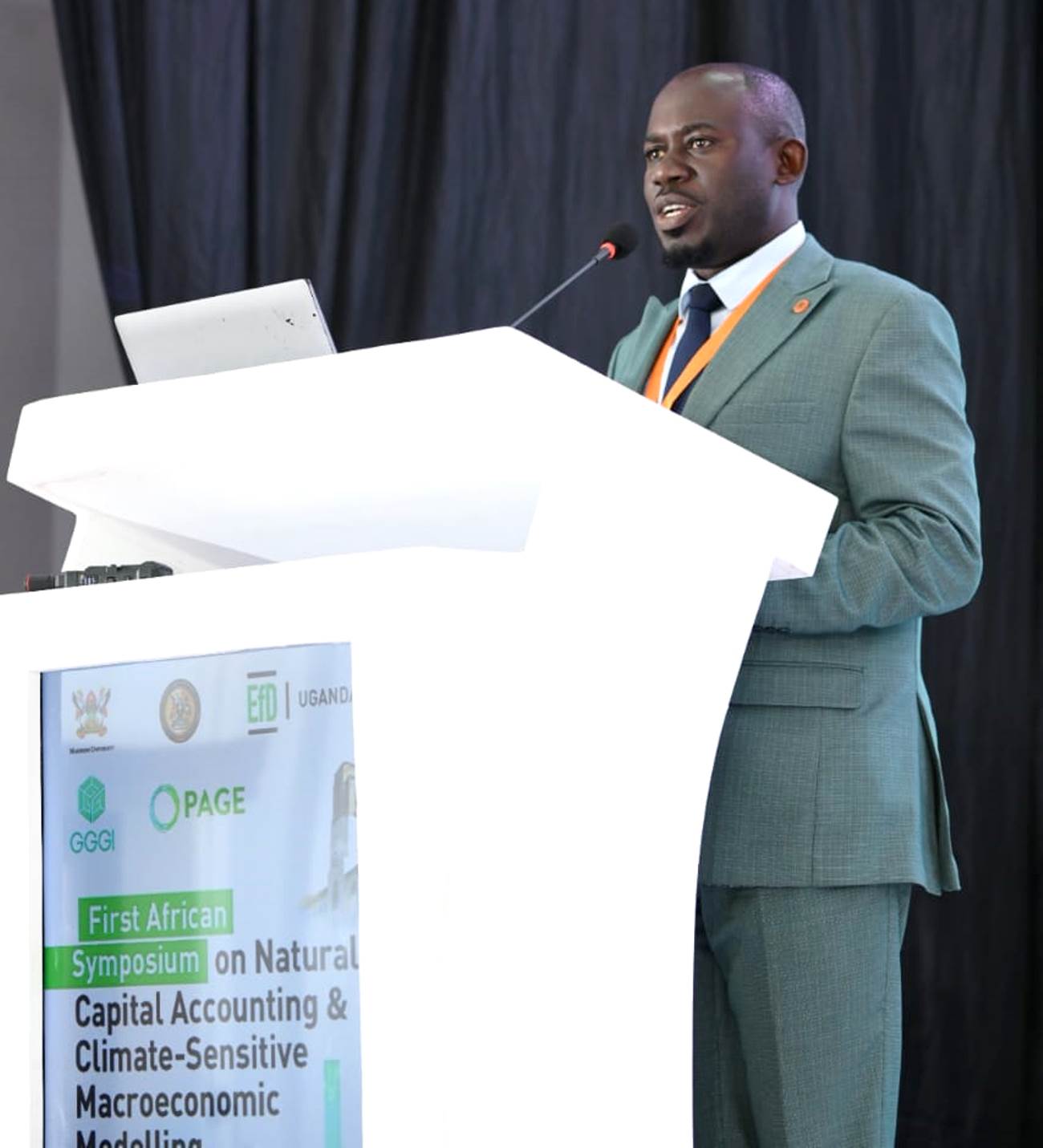
“To ensure capacity and produce more modellers, we are offering short courses on integrating climate and natural capital into macro models, as well as, the Master of Science in Macroeconomic and Investment Modelling. We call for continuous collaboration between policymakers, academia, and development partners so that we can develop more of these models,” he submitted.
Integrating data into macroeconomic models
Dr. Wilson Asiimwe, Senior Lecturer at the School of Economics, stressed the importance of integrating climate and natural capital data directly into macroeconomic models. He explained how forests, water, fisheries and land, which are vital for GDP and carbon sequestration, can be systematically incorporated into tools such as multiplier and CGE models using an Environmental Social Accounting Matrix.
“The first step is preparing the Social Accounting Matrix that captures all economic transactions in an economy—the demand and supply relationships among all economic agents. To integrate climate issues into CGE or multiplier models, you must map climate and natural capital data onto the existing Social Accounting Matrix of the country,” he said.
He elaborated that these models allow policymakers to simulate policy scenarios from forestry investments and infrastructure development to energy transitions, linking environmental outcomes to GDP, employment, revenue, and sectoral performance. By capturing emissions, resource use, and climate risks, Dr. Asiimwe emphasized that this approach provides actionable insights for sustainable growth, green investment, and climate-resilient planning in Uganda.
Symposium Outlook
By hosting the inaugural African Symposium on Natural Capital Accounting and Climate-Sensitive Macroeconomic Modelling, the Centre of Excellence for Africa Climate-Sensitive Macroeconomic Modelling (CEACM-established in August 2025) reinforced its role as a continental hub for research, training, and policy dialogue. The symposium was supported by the Global Green Growth Institute (GGGI) and the Partnership for Action on Green Economy (UN PAGE), with thanks to the generous contribution of its funding partners -European Union, Germany, Finland, Norway, Korea, Sweden, Denmark, and Switzerland.
Trending
-

 Humanities & Social Sciences2 days ago
Humanities & Social Sciences2 days agoMeet Najjuka Whitney, The Girl Who Missed Law and Found Her Voice
-

 Health6 days ago
Health6 days agoUganda has until 2030 to end Open Defecation as Ntaro’s PhD Examines Kabale’s Progress
-

 Agriculture & Environment5 days ago
Agriculture & Environment5 days agoUganda Martyrs Namugongo Students Turn Organic Waste into Soap in an Innovative School Project on Sustainable Waste Management
-

 General6 days ago
General6 days agoMastercard Foundation Scholars embrace and honour their rich cultural diversity
-

 Health2 weeks ago
Health2 weeks agoCall for Applications: Short Course in Molecular Diagnostics March 2026
